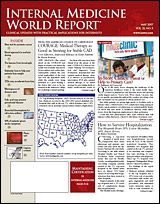Vitamin K May Reverse Warfarin-Induced Arterial Calcification
Warfarin (Coumadin) therapy is the most frequently used anticoagulation modality for patients with cardiovascular (CV) disease and risk of thrombosis. However, warfarin is also known to promote arterial calcification, by inactivating the Gla protein, a vitamin K–dependent protein that regulates calcium crystal formation in the vascular system. Arterial calcification is known to promote atherosclerosis, the main risk factor for CV disease.
Blood
Investigators of a preliminary animal study therefore postulated that adding vitamin K to the diet of patients taking warfarin would help regress arterial calcification and thus reduce CV events, including mortality, in those with coronary artery disease or chronic kidney disease (. 2007; 109:2823-2831).
Vitamin K consists of 2 main forms—phylloquinone (vitamin K1), which is found in green, leafy vegetables, and menaquinones (vitamin K1), which are primarily synthesized in the gut by microflora.
To test their theory, the investigators treated 10-week-old male Wistar Kyoto rats with a combination of warfarin and low-dose vitamin K1 for an initial 6 weeks. At the end of the initial 6 weeks, the rats were divided into 4 groups: the first group continued receiving warfarin plus the vitamin K1 diet as in the previous weeks, while the other 3 groups received vitamin K only—the control diet.
The control diet in the warfarin-free groups was supplemented with either normal-dose or high-dose vitamin K1, or with vitamin K1, for another 6 weeks.
During the initial 6 weeks of warfarin plus vitamin K1 supplementation, arterial calcium levels increased significantly in all the rats. And this trend continued in the normal-dose vitamin K1 group after the warfarin therapy was discontinued.
“In contrast, high-vitamin intake [both K1 and K1] not only blocked the progress of further calcium accumulation but also led to a greater than 37% reduction of previously accumulated arterial calcium precipitates within 6 weeks,” note lead investigator Leon J. Schurgers, PhD, and colleagues from Maastricht University, the Netherlands.
They add that this study provides preliminary evidence that warfarin-induced vascular calcification may be preventable, or even reversible, with high doses of vitamin K.
Clearly, these results need to be replicated in humans before any clinical recommendation can be made.
